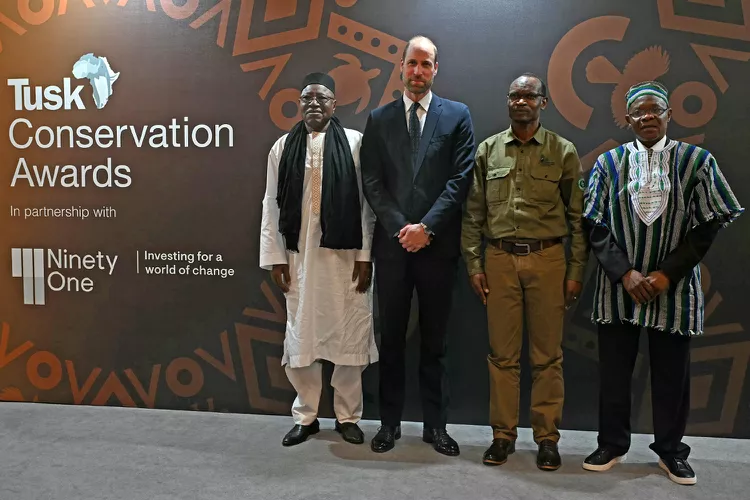ROYAL FAMILY
Just In: The Inside Story of Prince William’s Heroes for Wildlife: ‘He’s a Strong Advocate…. Check In

The Prince of Wales awarded his latest cohort of champions of conservation at his Tusk Awards on Nov. 27 — and each one has a story to tell
The leaders of conservation efforts in Africa, rewarded by Prince William at his Tusk Conservation Awards on Nov. 27, explained to PEOPLE more about their work and the impact that the awards will have on their ongoing efforts.
Three wildlife champions — from those on the frontline of the fight to preserve species endangered by poachers to one working to safeguard marine life — were picked for recognition. It comes after around 50 others from across 20 African countries have also won similar awards since the awards’ inception in 2013.
Speaking about William’s commitment to the worldwide conservation, Charlie Mayhew, founder and president of Tusk, tells PEOPLE, “For many years, the prince has been at the forefront of highlighting the catastrophic impact of the illegal wildlife trade and the challenges facing the natural world.”
“Through his patronage of organizations such as Tusk, he has been extremely effective at using his status and convening power for the greater good of conservation, a topic that he is hugely knowledgeable on,” he added.
Nomba Ganamé took home the Prince William Award for Conservation in Africa on Nov. 27. He works as head of field operations with the Mali Elephant Project, working across an area of around 60,000 square kilometers to develop a self-sustaining environment that makes space for elephants and other wildlife.
The foundation of this approach can be described as elephant-centered, community-led, natural resource management, as a way of setting aside elephant habitat and the migration route while also generating benefits for the local people,” he explains.
The process has to be representative, transparent and equitable to be able to endure,” he says.
“This model not only makes space for elephants but improves local livelihoods and provides an occupation for youth, while providing a mechanism for managing human-elephant conflicts to promote coexistence,” Ganamé adds.
They work to unify communities around a shared desire to safeguard the elephants and the livelihoods of the locals. Teams of young ecoguards are elected to conduct natural resource protection activities such as patrolling to ensure respect of the rules, building fire-breaks, planting trees and monitoring elephants.
Tusk’s founder Mayhew adds, “Prince William has always understood and shared the belief that the long term success of grassroots conservation relies upon the successful engagement of communities living alongside wildlife.”
He continues to be a strong advocate for the community-driven projects that Tusk has supported for over three decades, where people derive tangible benefits and greater security from conserving wildlife and habitats,” he says.
Senior ranger Claver Ntoyinkima works at Rwanda’s Nyungwe National Park and won the Tusk Wildlife Ranger Award on Nov. 27.
His “main concern” is “the protection of both the park’s biodiversity and safety of its wildlife. This includes addressing challenges such as poaching, illegal logging and human wildlife conflicts,” he says. “I am also focused on managing sustainable tourism to minimize environmental degradation while safeguarding the park’s rare ecosystems and endangered species. Conservation efforts are crucial for maintaining the park’s role as one of Africa’s oldest rainforests and a biodiversity hotspot.”
They are most concenred about the endangered birds, including Kungwe Aalis, and eastern chimpanzees, which are threatened by habitat loss and human-wildlife conflicts.
He praised the new initiative announced in Cape Town by William to help rangers across the world. is a broader commitment to enhance wildlife protection and improve the working conditions of rangers, who play a crucial role in safeguarding biodiversity.
The plan aims to provide 10,000 rangers with access to appropriate, affordable in-service accident, medical, evacuation and life insurance coverage, as well as training and leadership development. It will help ranger operations, giving them better tools for their roles, improvements to training and welfare, and enhance recruitment for the job.
He believes the award will help both recognition and credibility and enhance networking and help it as it advocates for policy improvements locally and internationally.
Tusk’s Mayhew explains that William was not only personally instrumental in helping establish the awards in 2013, but says it was his suggestion to include a specific one to recognize the work of wildlife rangers.
“The prince has always taken a close interest in the vital work of rangers,” Mayhew says. “His recent announcement in Cape Town to launch the new joint initiative to ensure more rangers have access to accident, medical, evacuation and life insurance cover is a further example of his own commitment to the ranger sector.”
Edward Aruna, founder and managing director of the Reptile and Amphibian Programme (RAP-SL ) in Sierra Leone, received the Tusk Award for Conservation in Africa.
He has been working to protect sea turtles, which are threatened by fishing, as they get mistakenly caught in nets, and — although it is outlawed — eating of turtle meat and eggs still continues clandestinely, he says. Pollution and climate change have also affected their numbers, while tourism and human activity on beaches can harm their nesting.
“Sea turtles have been an important part of the marine environment since creation,” he tells PEOPLE. “Local fishermen and communities have interacted with sea turtles for thousands of years, but the majority don’t understand the status of the species and roles they play in the marine environment.”
Aruna works to help people “understand the status and the roles played by these magnificent species in the marine environment is invaluable to both the species and locals,” he says. “In conservation, it is only when locals understand the importance of the resources for which a campaign is about that they will comply with whatever conservation effort is ongoing in their communities.”
He says sea turtles are “loveable animals” that can bring tourists to communities, and adds they also attract nutrients to beaches after they lay their eggs. Nutrients help nurture regrowth of vegetation on the beach to counter erosion. They also feed on jellyfish, countering swarms of the creatures.
He tells PEOPLE the award “will bring the project more opportunities that will empower the locals and staff to work more effectively towards the building of a more secured future for sea turtles and the marine environment [in] Sierra Leone.”
It will also help establish RAP-SL as a “stronger and more respected voice for biodiversity conservation in the country,” he says.
RAP-SL is planning to extend its activities to more coastal communities for beach and bycatch monitoring while also undertaking community development programs within more communities. The community development aspect of the project is creating the most needed impact for sea turtle conservation in Sierra Leone.























